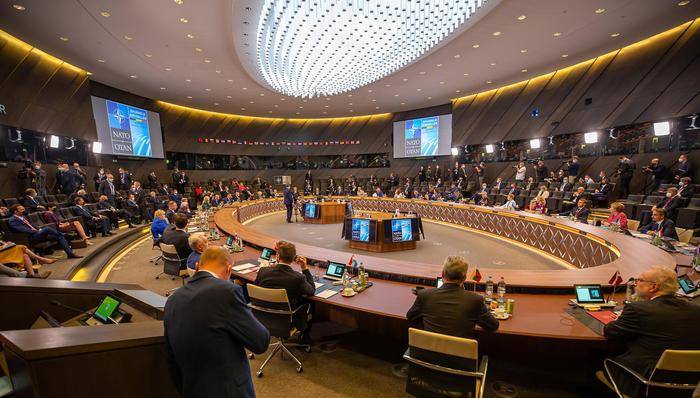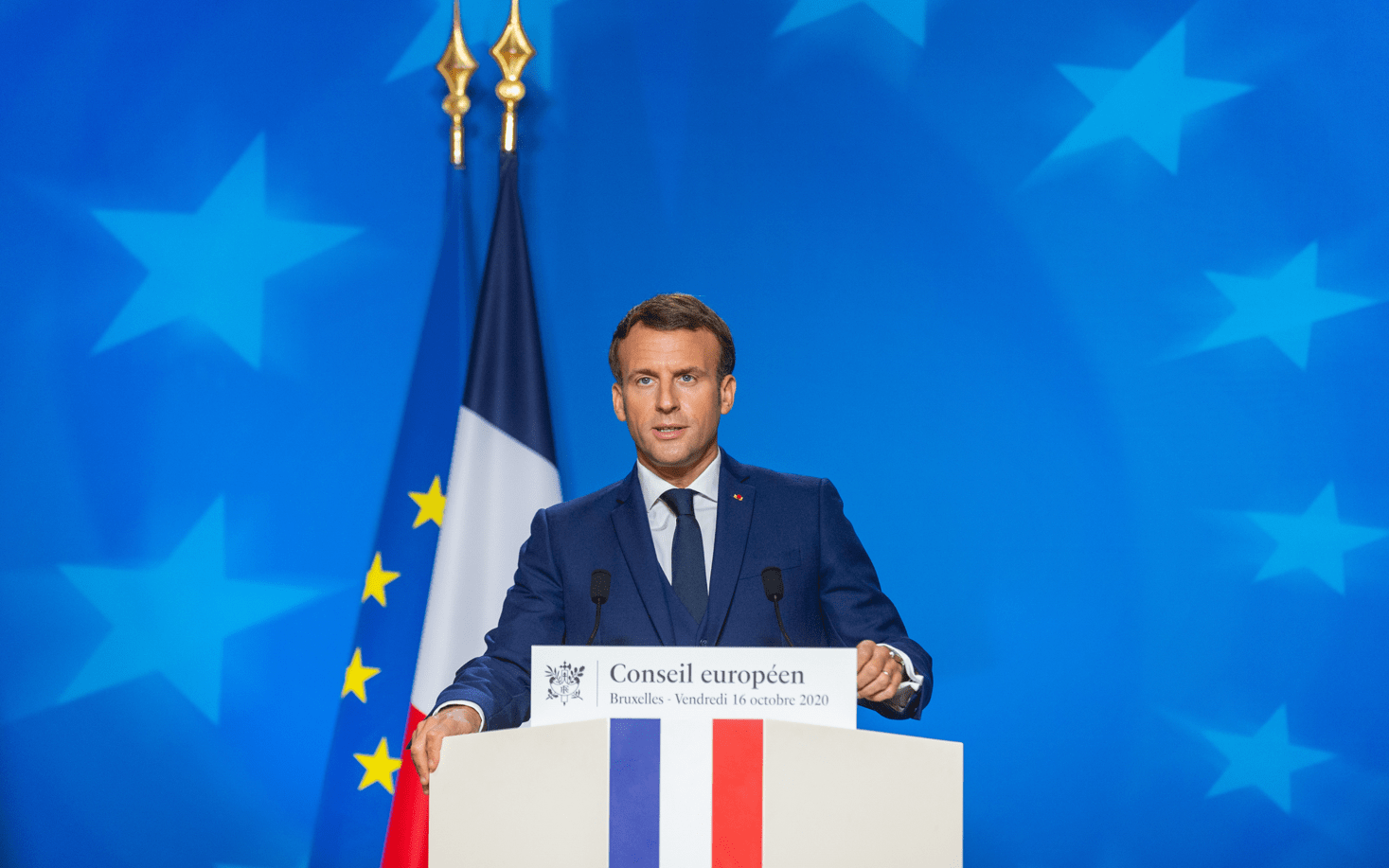A few days ago, according to media reports, because French President Macron opposed NATO’s establishment of a representative office in Japan, this action strongly advocated by the US and Japanese governments faced insurmountable obstacles.
On June 5 local time, the British “Financial Times” quoted as many as eight “sources familiar with the relevant inside information” as saying that due to the opposition of French President Macron, NATO established the organization’s first official in Asia in Tokyo, the capital of Japan. representative office (Called “liaison office”, not strictly speaking exactly)The plan was put on hold for several months.
In 2007, then Japanese Prime Minister Shinzo Abe became the first Japanese head of government to visit the NATO headquarters in Brussels, and proposed to set up representative offices with NATO for the first time. In 2018, under the vigorous promotion of the United States and the United Kingdom, the Japanese liaison office in NATO was established in the form of an affiliated organization of the Japanese embassy in Belgium. However, due to serious differences in various aspects, NATO has been unable to reach an agreement on the establishment of its representative office in Japan .
In January this year, NATO Secretary-General Jens Stoltenberg made a high-profile visit to Japan and reached a consensus with Japanese Prime Minister Fumio Kishida to “strengthen mutual relations”. representative office.
On May 1, Japan’s “Nikkei Asia” published exclusive news, citing sources from “Japan and NATO officials” and reported that the NATO representative office in Japan will be officially opened in 2024, and it is very likely that it will open in 2023. July NATO Summit (July 11-12 in Vilnius, Lithuania)Finalize this matter.
If the latest news from the “Financial Times” is true, it shows that NATO members have not yet reached a “consensus” on whether to extend their tentacles beyond the scope of the North Atlantic, as the United States, Japan, Britain and other countries have tried to express.
According to the analysis of the tone of the report, Macron has long had reservations about NATO’s establishment of a representative office in Tokyo, Japan. Just last week, Macron stressed at a meeting that pushing NATO to expand its coverage “beyond its geographic boundaries” would be “a colossal mistake”, the report said.
The report also quoted “another unnamed source” as saying that France was unwilling to support policies that “could exacerbate tensions between NATO and China.”
Last month, Chinese Foreign Ministry spokesperson Mao Ning commented on relevant news, saying that Asia is a highland of peace and stability, and a hot spot for cooperation and development, and should not become an arena for geopolitical struggles. After that, she also emphasized that NATO’s continued eastward expansion into the Asia-Pacific and its interference in regional affairs will inevitably undermine regional peace and stability, and neighboring countries should show high vigilance against its actions.
▲Data map:NATO Secretary General Jens Stoltenberg.Photo/Xinhua News Agency
Why France sings a different tune
In fact, Macron has always opposed NATO’s involvement in the so-called “Indo-Pacific” region, and is not even very interested in the concept of “Indo-Pacific” initiated by the United States and talked about by Japan and India.
This is because “maintaining a close relationship with NATO but at a certain distance” in order to maintain its own independence has been a consistent basic national policy of France after the war.
When NATO was established in 1949, France, which had suffered from “subjugation” in World War II, became one of the founding members. At that time, NATO even set up its headquarters in Paris, the capital of France.
But the 1956 Suez Canal Crisis (Britain, France in order to reoccupy the Suez Canal, and Israel’s military operations against Egypt at the end of October of the same year)Among them, the United States refused to save France, which was in crisis and could not extricate itself, and even made trouble, which greatly hurt the self-esteem of the French.
1958, with the Algerian crisis (The crisis caused by the French 10th Airborne Division’s attempted coup due to the Algeria issue)As the country deepened, Charles de Gaulle came back to power and established the Fifth French Republic. He then proposed an “independent” diplomatic and military strategy of “neither the East nor the West”, and asked the United States to return the command of France’s garrison in NATO.
After being rejected, France announced its withdrawal from NATO military integration in 1965 (Officially withdrew in early 1966)take back all command of the army and force the NATO garrison to withdraw from French territory (Completed in 1967)NATO headquarters has since moved to Brussels.
Since then, France has completely decided whether to “link” with NATO according to its own wishes: it participated in the multinational force of the Gulf War that broke out in 1991 as an independent subject, and it also handed over its troops to NATO to command its troops “once” to participate in the war in Bosnia and Herzegovina. Peacekeeping operations, but refused to follow the United States to participate in the wars in Iraq and Afghanistan.
Since “withdrawing from NATO military integration” is not withdrawing from NATO, France will not participate in NATO military operations and enjoy NATO military protection during the withdrawal period, but still has to pay membership fees (about 15% of NATO’s non-military budget)。
With the disintegration of the Warsaw Pact and the end of the Cold War, the Eastern and Western camps were once blurred, and the Gaullistism of “neither the East nor the West” seemed to be aimless. In 2009, under the impetus of Sarkozy, known as “the most pro-American president of the Fifth Republic”, France returned to NATO military integration.
However, France’s return did not bring the “respect of its allies” as Sarkozy boasted. Instead, it had to be “coordinated” one after another. The political party to which he belongs is not popular at all. Sarkozy himself failed to be re-elected, and his Republican party has not been in power since his defeat, and could not even reach the run-off.
Before the Russian-Ukrainian conflict broke out, Macron repeatedly emphasized “European self-defense”, advocated downplaying NATO’s influence in Europe, and reducing the European continent’s dependence on the security protection of the United States. Transaction is not interested.
Russia-Ukraine conflictThe outbreak of the virus has left the European continent, especially NATO and the Eastern European Union member states, feeling bitter. For a while, the concept of NATO became popular again in Europe, and it was inconvenient for Macron to significantly innovate on the issue of European defense.
But “Indo-Pacific” is another matter.
Previously, the United States and the United Kingdom built an “inner core circle” of “three countries” and “quartet” within NATO, especially using these “small circles” to seize the vested interests of France, such as forcibly grabbing France in Australia. The French government and opposition parties have long been aggrieved by the submarine contract.
If it is said that they have the right to accept the statement that “this is something that NATO should manage” and that “France is also obliged to participate” in the “military threat from eastern Europe”, then, under the banner of NATO, they are far away from the geographical category of “North Atlantic”. , Going to the distant “Indo-Pacific” to “take chestnuts from the fire” is of course unwilling and unwilling. Moreover, this move may also offend China.

▲Data map: The scene of the NATO summit filmed at the NATO headquarters in Brussels, Belgium.Photo/Xinhua News Agency
Will Macron change his position?
But there is no need to take Macron’s attitude too seriously.
As many analysts have said, the definition of NATO’s “liaison office” is vague and broad. Although the name of the agency is the same in different countries, the scope of responsibilities is quite different. Rather than focusing on whether an agency is established or abolished, it is better to focus on the more substantive Such as NATO’s substantive actions to maintain and expand its military hegemony in the “Indo-Pacific”.
NATO has a rule of “unanimous approval” for major affairs. As long as a French member state vetoes it, it is impossible to establish a representative office in Japan. What’s more, the NATO member states that disagree with this move are far from being the only one in France.
It is worth mentioning that Macron’s “veto” of NATO’s establishment of a representative office in Japan was first published on the “Financial Times” with a British background, and was widely published by “Japan Net” and others.
However, the main French media, known as developed and highly sensitive to state affairs news, hardly mentioned a word before and after the event. (A few non-mainstream French-language platforms made brief reports in the form of reprinting news from the Financial Times)This also shows from one aspect that France is not interested in this matter, just like “military intervention in ‘Indo-Pacific’ affairs” itself.
Written by Tao Duanfang (columnist)
Editor / Chi Daohua
Proofreading/Chen Diyan Return to Sohu to see more
